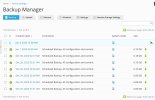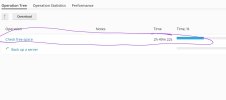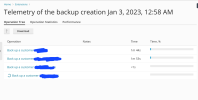VirtualHorror
New Pleskian
- Server operating system version
- CentOS 7.9
- Plesk version and microupdate number
- 18.0.49
Hello,
I seem to be having a peculiar issue with Plesk Backup Manager. I am not certain as to when this issue exactly started but I believe I noticed the backups were taking very much longer than usual to complete (about 14-18 hours) about 2 months ago but I ignored it since the backups were being successfully completed even if it took long.
Yesterday when I was looking at backup manager it caught my attention that there was a gap of 1 day between full backups eventhough they were scheduled to backup at 00:45 everyday and retain 7 days of backups as you can see in the screenshot.

Scenario:
I opened up backup telemetry to check what was happening and was surprised when I noticed that it seemed to be taking the longest time (almost 3 hours) for listing files of a particular website which isn't normal since it didn't take so long before this issue started and absolutely no changes have been made to configuration of the website as I personally manage it. None of the other websites on the server seem to be taking so long to list files.



I noticed that even after it had checker for free space/listed files it took a very long time for archiving the files for that website once again (10-11 hours; not sure of the exact time but I am presuming so based on total time the backup used to take that I mentioned earlier.) Please note: In the screenshot below, the archive creation process is still going on and was not completed within 2h 33m as shown

I went on to investigate the particular website and realized that the website had have a fairly low file count as well as low disk space usage (~500 MB) as you can see in the screenshot below BUT the disk space manager was not able to list the files/disk usage of
folder but the disk space space of all other folders was listed. I thought this was unusual. (Yes, this website runs WHMCS)
I tried to access the folder through Plesk file manager, tried to list files through SSH and FTP to no avail.
I then remembered that raising folder was created to store the temporary PHP session files of WHMCS


I the stopped the backup thinking the whmcs-php-temp folder was the issue as it contained a lot of files and took a lot of time to load.
I then created a new backup job excluding that particular folder but it didn't help as it's still running till now....
SERVER SPECIFICATIONS:
CPU Model: Intel Xeon E5-2690 v3 @ 2.60GHz
Cores: 8
RAM: 8 GB
Swap RAM: 6 GB
Disk: 1 TB RAID 10 HDD
Network speed: 2 Gbps
I have confirmed that during backups the IO, CPU Usage, RAM, Storage are within normal limits (~30%) and am absolutely sure that it is nothing to do with the server resources or hardware.
I have also confirmed speed test between our Plesk server and backup server is about (~1.2 Gbps most of the time)
Plesk Scheduled Backup configuration:
Scheduled backup task time: 00:45 everyday
Backup retention: 7 full backups
Backup type: Full backup
Backup content: Configuration, Mail messages, User files and databases
Store in: FTP storage
Maximum number of simultaneously running scheduled backup processes: 3
Run all backup processes with low priority
Priority: 7
IO Priority: 5
Compression level: Fast
Start the backup only if your server has the specified amount of free disk space (in megabytes) : 2048
I seem to be having a peculiar issue with Plesk Backup Manager. I am not certain as to when this issue exactly started but I believe I noticed the backups were taking very much longer than usual to complete (about 14-18 hours) about 2 months ago but I ignored it since the backups were being successfully completed even if it took long.
Yesterday when I was looking at backup manager it caught my attention that there was a gap of 1 day between full backups eventhough they were scheduled to backup at 00:45 everyday and retain 7 days of backups as you can see in the screenshot.

Scenario:
I opened up backup telemetry to check what was happening and was surprised when I noticed that it seemed to be taking the longest time (almost 3 hours) for listing files of a particular website which isn't normal since it didn't take so long before this issue started and absolutely no changes have been made to configuration of the website as I personally manage it. None of the other websites on the server seem to be taking so long to list files.



I noticed that even after it had checker for free space/listed files it took a very long time for archiving the files for that website once again (10-11 hours; not sure of the exact time but I am presuming so based on total time the backup used to take that I mentioned earlier.) Please note: In the screenshot below, the archive creation process is still going on and was not completed within 2h 33m as shown

I went on to investigate the particular website and realized that the website had have a fairly low file count as well as low disk space usage (~500 MB) as you can see in the screenshot below BUT the disk space manager was not able to list the files/disk usage of
Code:
whmcs-php-tempI tried to access the folder through Plesk file manager, tried to list files through SSH and FTP to no avail.
I then remembered that raising folder was created to store the temporary PHP session files of WHMCS


I the stopped the backup thinking the whmcs-php-temp folder was the issue as it contained a lot of files and took a lot of time to load.
I then created a new backup job excluding that particular folder but it didn't help as it's still running till now....
SERVER SPECIFICATIONS:
CPU Model: Intel Xeon E5-2690 v3 @ 2.60GHz
Cores: 8
RAM: 8 GB
Swap RAM: 6 GB
Disk: 1 TB RAID 10 HDD
Network speed: 2 Gbps
I have confirmed that during backups the IO, CPU Usage, RAM, Storage are within normal limits (~30%) and am absolutely sure that it is nothing to do with the server resources or hardware.
I have also confirmed speed test between our Plesk server and backup server is about (~1.2 Gbps most of the time)
Plesk Scheduled Backup configuration:
Scheduled backup task time: 00:45 everyday
Backup retention: 7 full backups
Backup type: Full backup
Backup content: Configuration, Mail messages, User files and databases
Store in: FTP storage
Maximum number of simultaneously running scheduled backup processes: 3
Run all backup processes with low priority
Priority: 7
IO Priority: 5
Compression level: Fast
Start the backup only if your server has the specified amount of free disk space (in megabytes) : 2048


